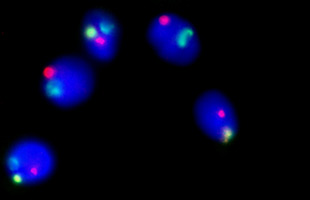Sperm DNA damage and genetic screening
A full detailed semen analysis is limited in the information it can provide. While it gives us a lot of information about whether there are sufficient sperm moving well enough to reach the egg, it tells us nothing about the sperm’s ability to bind to the egg once it gets there, and nothing about the genetic integrity of the sperm.
Of course, by far the greatest contribution of a sperm to the embryo is that of its genetic constitution, which is key to an ongoing pregnancy. Evidence suggests that the most common type of genetic damage in sperm is that of DNA fragmentation which is present in up to 40% of infertile men. Even though sperm DNA damage is more likely in sperm with abnormal semen parameters, the DNA can even be damaged in men who have normal semen parameters. DNA fragmentation is associated with reduced fertility and an increased risk of miscarriage and also reduces the chances of a successful outcome with fertility treatment.
Causes of DNA damage in sperm
- varicocele
- oxidative stress
- abnormal sperm development
- elevated testicular temperature
- infection and pus cells
- drug use
- chemo- or radiotherapy
- poor diet
- cigarette smoking, alcohol, caffeine
- occupational or environmental toxins
- advanced age
Who may benefit from DNA fragmentation testing?
The tests may be helpful if you have any of the following:
- poor semen parameters
- unexplained infertility
- poor embryo development
- recurrent failed IVF or ICSI treatment
- recurrent miscarriage in partner
- advanced age
- varicocoele
- exposure to harmful substances
Treatment for Sperm DNA damage
One of the most effective ways to reduce sperm DNA damage is to encourage frequent ejaculation as this has been shown to significantly reduce sperm DNA damage and improve pregnancy outcomes.
Sperm DNA fragmentation may be caused by oxidative stress resulting from varicocele or infection. Varicocele repair may improve sperm DNA integrity and treatment of infection with antibiotics may also be beneficial in reducing sperm DNA damage.
Alternatively, oxidative stress may arise from a lack of antioxidants in the semen. A change in lifestyle and a diet rich in antioxidants may help reduce the levels of DNA fragmentation in some of these cases.
Studies using antioxidant supplements to reduce DNA damage are promising. However, it is not always possible to repair sperm DNA damage. In these cases, use of testicular sperm for fertility treatment using ICSI may be advised.
Chromosome Abnormalities
There are other genetic abnormalities that are associated with male infertility:
- Whole chromosome defects (inherited or congenital)
- Deletions in the male Y chromosome
- Genetic mutations
These conditions are less common than sperm DNA damage but nevertheless may cause severe problems with sperm production. Genetically damaged sperm may also contribute to very early embryo loss.
Fortunately, there are tests available to assess various aspects of sperm genetic integrity which may give us clues as to the cause of the male contribution toward failure to conceive or recurrent miscarriage.

Fertility Testing
- Comprehensive semen analysis
- Sperm DNA damage and genetic screening
- Oxidative stress
- Retrograde ejaculation
- Infection screening
- Testicular ultrasound scanning
- Hormone profiles
- Well man screening
Have a question?
We understand that fertility is a very personal and private matter. We’re here to answer any questions you may have. Contact us to arrange an appointment or read our FAQs.
